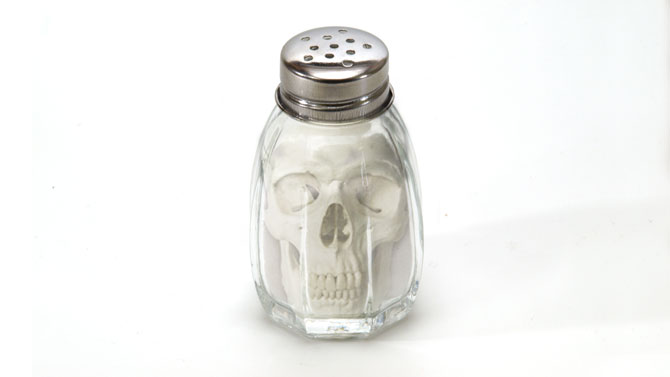


SALT'S SINISTER SIDE
Illustration by Jeffrey Chase May 20, 2016
Grant supports study of salt's effect on brain neurons, blood pressure
So your blood pressure is nice and steady, 110 over 70 most of the time, and nobody's telling you to put that salt shaker down or opt out of those sea-salt-slathered morsels on the menu.
And salt is only dangerous for those with high blood pressure, right?
Maybe not.
Scientists know a small amount of dietary salt is essential for proper balance of fluids in the body. But most people in the United States eat more than six times the amount needed to maintain cellular health. And as scientists learn more about the effects of salt on cardiovascular health, their concerns and questions are growing.
A new $2.6 million, four-year grant from the National Institutes of Health will support research by two University of Delaware physiologists and a Penn State College of Medicine neuroscientist on the question. Specifically, they will look at the effect sodium has on brain neurons and the cardiovascular health of those with normal blood pressure readings.
It's a new way of looking at a high-stakes issue. Cardiovascular disease is the No. 1 killer of people around the globe.
University of Delaware physiologists William Farquhar and Megan Wenner and Penn State's Sean Stocker will collaborate on the study, looking especially at how sodium affects the brain neurons that control blood pressure, examining the impact of varying quantities on humans and rodents with normal blood pressure levels.
They will study the effects of low-sodium diets (1,000 milligrams or less per day), medium amounts (2,300 mg) and high sodium intake (7,000 mg or more).
"Individuals with high blood pressure are already cautioned about eating too much sodium," said Farquhar, chair and professor of kinesiology and applied physiology. "However, those with normal blood pressure may think that they can eat as much sodium as they want. Our focus on adults with normal blood pressure may raise awareness of the potential harmful effects of excess dietary sodium, even in the absence of hypertension."
The research team will test their hypothesis that sodium sensitizes neurons in the brain that regulate blood pressure through what is called "sympathetic nerve activity" (SNA). SNA is critical for regulating blood pressure at rest and in response to activities such as walking, climbing stairs and other actions.
"It is already well known that high dietary sodium may contribute to elevations in resting blood pressure," Farquhar said. "It is also increasingly appreciated that high dietary sodium contributes to blood vessel dysfunction. The proposed studies will be the first comprehensive assessment of various dietary sodium levels and cardiovascular reactivity."
High blood pressure variability has been associated with organ damage and poor cardiovascular function, Farquhar said. In a recent article in the Journal of the American College of Cardiology, Farquhar and co-authors David Edwards (UD), Claudine Jurkovitz (Christiana Care) and William Weintraub (UD) reported that excess sodium can harm blood vessel function, kidney function and heart function.
The work will advance clinical human studies as well as animal studies as the UD team's data with humans are compared with Stocker's data with animals.
Contact Us
Have a UDaily story idea?
Contact us at ocm@udel.edu
Members of the press
Contact us at 302-831-NEWS or visit the Media Relations website

